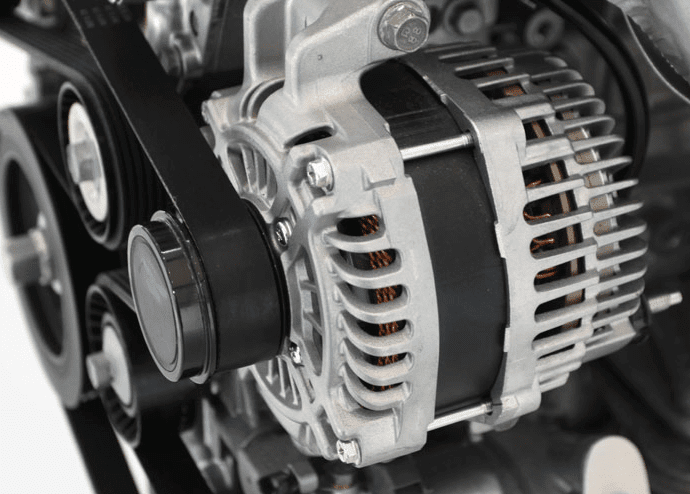What makes an alternator go bad?
The alternator is the main component to provide an electrical current while the engine is running. Yes, if the battery providing electrical current if the engine is off, the alternator works when the engine is running.
The alternator will charge the battery and provide electrical current to entire car electric components such as control units, headlamps, meters, instruments, etc.
Your car will have no electric power without a good working alternator because the all-electric needs are supplied only by the car battery. As the battery drains out, your car will jam sooner.
Here are some examples of what happens when an alternator go bad :
- Your car's electrical components will not have enough power, so that it may cause abnormal behavior. For example, your headlights dimmed at idling rpm and get bright when you rev it. This symptom is known as Undercharging.
- Boiled battery water (wet type battery), and for maintenance-free battery, the battery's body will look bloated. This symptom is known as Overcharging. These common causes are from faulty voltage regulator which is sent overvoltage to the battery.
- The car battery not charging because the alternator does not charge your battery. So, there is no electric current on your car. Your car's electrical components will OFF, and you can't start your engine.
- Noises from your car engine; Mostly from the alternator because they are routine issues such as worn out bearing or slipping alternator belt.
In this post, we will give you some information about what makes an alternator go bad. See the detailed information below.
1. Wrong belt tension adjustment
The first common cause that makes an alternator go bad is the wrong belt tension adjustment. Too tight belt tension can make the alternator bearing worn out faster because of too many loads inside the pulley and shaft. It makes the bearing rotation is in unbalance conditions.
Over time, the bearings are worn out and create mechanical issues inside the alternator, such as noise and squealing. Too loose belt tension also isn't good either. It can cause squealing noises and undercharging conditions.
Make sure that your alternator belt tension tightens up to its specification were recommended by your carmakers. Moreover, if your car is equipped with a manual belt tension adjuster. If your car has a spring-loaded tensioner, you should at least inspect it at 50,000 miles when you change the belt.
2. Dust and dirt
The second common cause that makes an alternator go bad is dust and dirt. Dust and dirt can prevent electric current flowed from the carbon brush to the slip ring inside the alternator.
Yes, the carbon brush and slip ring are friction components. If the surfaces are covered by dust and dirt, it will prevent the electric current flow. So the dust and dirt can creates any malfunctions to the alternator. Bad alternator causes of dust and dirt are commonly found on the vehicles were used on the offroad track.
Read also:- How to check if your alternator is bad?
- #5 Signs of car alternator problem
- How to test an alternator without multimeter?
3. Corrosion
Corrosion is the next common cause that makes an alternator go bad. Irons and steels make several materials of the alternator. For example, the alternator pulley, bearings, connecting bolts and nuts for the wiring harness, etc. The materials of the alternator are corrosion-able.
Here are the examples of corroded alternator components :
- A corroded pulley can make the alternator belts worn out faster. It could slip, created smoke and heat, and the worst is the belt will be broken.
- A corroded alternator bearing can make the bearing jammed and causes loud noises and a faulty alternator.
- Corroded connecting bolts and nuts can interrupt the currents flow, so undercharging and not charge will happen.
Corrosion will happen to the car used in the salty area, like the beach, or if the car did not use for long periods without doing any scheduled maintenance.
4. Electrical shock
The last common cause that makes an alternator go bad is an electrical shock. Today's cars use an IC regulator to control the output voltage of the alternator. This IC regulator is very susceptive to any electrical shock.
The IC regulator can easily break if there are any electrical shock happens such as:
- Reconnect the battery terminal while the alternator is running
- Reconnect the alternator socket when it's running.
Reconnect the battery terminal or alternator socket while it's running can cause an electrical shock to the IC regulator so that it can be broken or damage suddenly.
